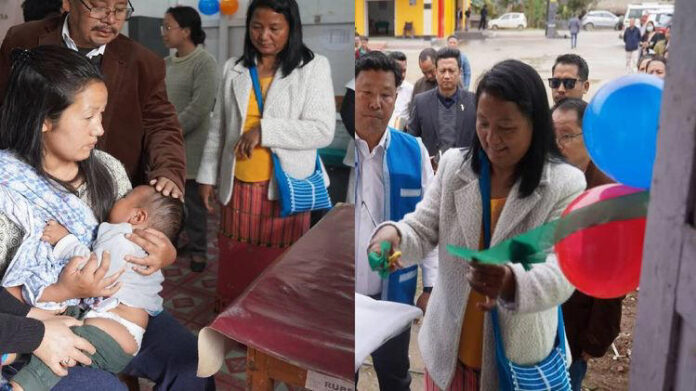The government of Arunachal Pradesh launched the Special Vaccination Campaign 3.0 in the state’s Leparada district. The campaign, aimed at improving immunization rates in underserved and remote areas, marks a crucial milestone in the state’s efforts to combat vaccine-preventable diseases and enhance overall public health. The initiative is part of a broader national strategy to increase vaccination awareness, address vaccine hesitancy, and ultimately protect communities from preventable illnesses.
A Strategic Initiative to Enhance Immunization Coverage
Leparada, a district in Arunachal Pradesh located in the northeastern part of India, has faced significant challenges when it comes to healthcare accessibility. Its rugged terrain, difficult-to-reach villages, and remote location have historically posed barriers to effective healthcare delivery, including immunization services. The Special Vaccination Campaign 3.0 was conceived to overcome these barriers and ensure that every eligible individual, particularly children and pregnant women, receives timely vaccinations.
The campaign was launched with the goal of ramping up vaccination efforts, especially focusing on areas that have historically been underserved. The state government, in partnership with district health authorities and healthcare workers, is working to ensure that residents in Leparada—many of whom live in hard-to-reach, remote areas—can receive their vaccinations without facing obstacles.
Focus on Vulnerable Populations
One of the key features of this vaccination campaign is its emphasis on reaching vulnerable populations. This includes children who may have missed previous immunization rounds, pregnant women who require specific vaccines, and other high-risk groups who may be exposed to preventable diseases.
Health officials have highlighted the importance of ensuring that children receive their basic immunizations, such as those for polio, measles, hepatitis B, and tuberculosis, in order to reduce mortality and morbidity in the region. Similarly, pregnant women are encouraged to get vaccines that prevent diseases like tetanus, which can be particularly harmful during pregnancy and childbirth.
The campaign also targets areas where vaccine hesitancy has been identified as a barrier to immunization. To combat this, local health authorities are working closely with communities, using awareness programs to educate residents on the importance and safety of vaccines.
Implementation on the Ground
To ensure the success of the Special Vaccination Campaign 3.0, the district administration in Leparada has set up vaccination centers in multiple locations, including primary health centers, anganwadi centers, and mobile vaccination teams that will visit remote villages. The campaign’s reach is extended to even the most isolated villages, where healthcare access is limited.
In addition to traditional vaccination methods, health officials are utilizing innovative approaches, such as outreach programs and community engagement, to ensure that people come forward to receive their vaccinations. Community leaders and local influencers have been enlisted to spread awareness and encourage participation, helping to reduce doubts and misconceptions about vaccines.
To streamline the process and increase efficiency, local authorities have ensured that there is a sufficient stock of vaccines, along with the necessary equipment and trained healthcare personnel to carry out the vaccination drives. Moreover, the state government has coordinated with national health authorities to guarantee that the campaign is well-supported, with regular monitoring and supervision.
Addressing Challenges in Remote Areas
One of the main challenges faced in implementing the Special Vaccination Campaign 3.0 in Leparada is the district’s rugged geography, which makes it difficult for healthcare workers to reach certain areas. The state government has made provisions for mobile vaccination units, which are equipped to navigate the difficult terrain and bring vaccines directly to the doorsteps of residents.
Transportation and communication issues are another concern, as many remote villages lack easy access to transportation infrastructure, and residents may be unaware of vaccination schedules. In response, the government is using a variety of communication strategies, including radio announcements, posters, and community meetings, to inform people about the campaign and encourage them to participate.
The Role of Local Communities
The success of the Special Vaccination Campaign 3.0 depends significantly on local communities’ involvement and cooperation. Health authorities have emphasized the importance of involving community leaders in the campaign, as they play a key role in convincing people to trust health workers and participate in immunization efforts.
Additionally, the involvement of women’s groups, youth organizations, and local volunteers has been crucial in reaching out to more remote and hard-to-access areas. These grassroots efforts are essential for overcoming any skepticism surrounding vaccines and ensuring that the population understands the long-term health benefits of immunization.
A Step Toward Achieving Herd Immunity
The launch of Special Vaccination Campaign 3.0 is part of Arunachal Pradesh’s broader efforts to enhance public health outcomes and work toward herd immunity. Vaccinating a large proportion of the population is critical to preventing the spread of infectious diseases and protecting vulnerable groups, such as infants, the elderly, and those with compromised immune systems.
By targeting both rural and urban populations, as well as focusing on vulnerable groups, the campaign is expected to significantly improve vaccination coverage in Leparada district and across the state. Additionally, successful execution of the campaign will contribute to India’s national immunization goals, which aim to eliminate vaccine-preventable diseases across the country.
The Special Vaccination Campaign 3.0 launched in Leparada district is an important step toward improving public health and ensuring that all residents, regardless of their location or socio-economic status, have access to vital vaccines. By focusing on reaching remote and underserved populations, addressing vaccine hesitancy, and utilizing innovative outreach strategies, the campaign is helping to create a healthier, more resilient community.
As healthcare systems around the world continue to face new challenges, initiatives like the Special Vaccination Campaign 3.0 are critical in ensuring that immunization programs reach their full potential, ultimately safeguarding the health and well-being of future generations. The efforts in Leparada serve as a model for other regions to emulate in the quest to increase vaccination coverage and protect communities from preventable diseases.




